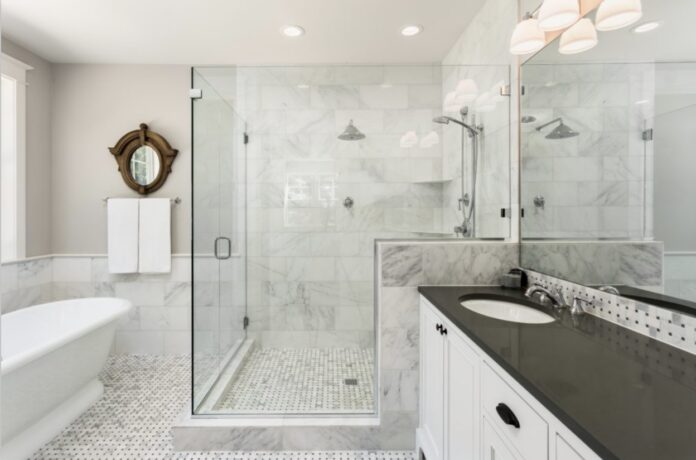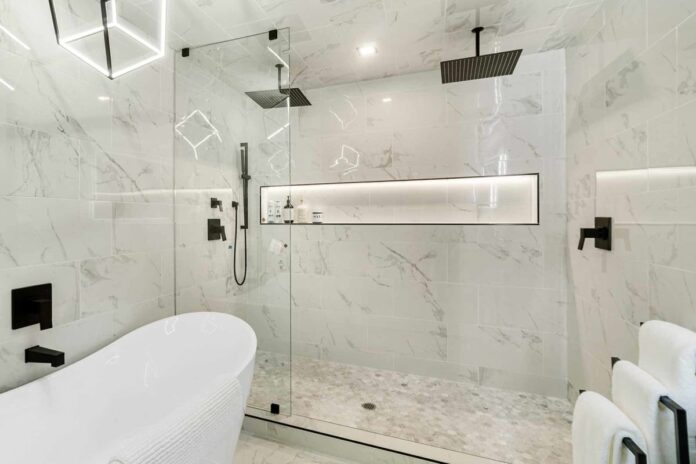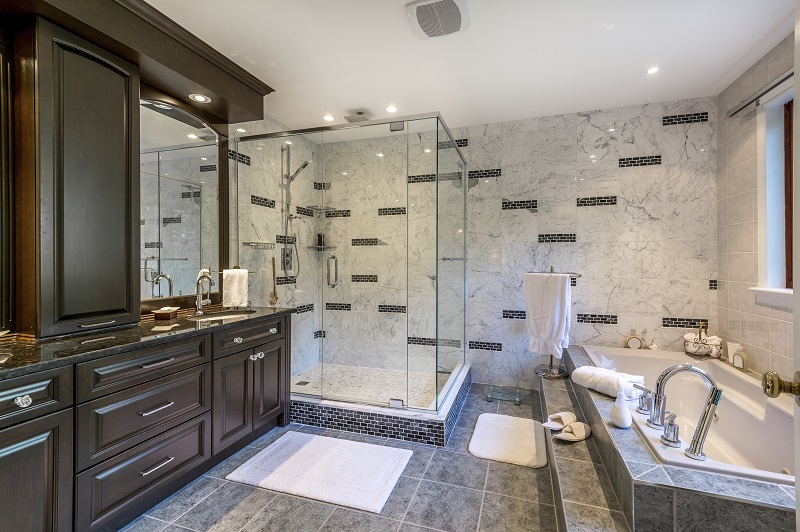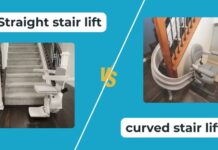Walk-in showers have gained a lot of popularity in the last decade. You will see so many people replacing their bathtubs with these.
They are more accessible and easy to use, which is the primary reason for many to install them.
But how much do they cost? Let’s talk about it.
Prefab vs. Custom Design

Prefabricated walk-in showers are a popular choice for those looking to streamline both cost and installation time.
These units are manufactured off-site and come in a variety of standard sizes and designs, making them easy to integrate into most bathroom layouts.
Average costs can range from as low as $800 for basic models to around $3,000 for more advanced options with features like built-in seating or high-quality finishes.
The appeal of prefab units lies in their cost-effectiveness and quick walk-in shower installation, typically requiring less labor compared to custom designs.
On the other hand, custom walk-in showers are designed to fit specific bathroom spaces and personal tastes, which can significantly increase their cost.
The price of custom showers can start from $4,000 and can go much higher depending on the complexity of the design, the materials chosen, and the intricacies of installation.
High-end materials like natural stone, bespoke tiles, and specialized fixtures can further escalate costs. Labor charges are also higher due to the skilled craftsmanship required for unique configurations and detailing.
Shower Size and Configuration

The size and configuration of a walk-in shower play crucial roles in determining the overall cost. Smaller, standard-sized showers are generally more affordable, with costs increasing proportionally with size.
A typical 3 by 4-foot walk-in shower might cost between $1,000 and $5,000 depending on the materials and features involved. However, expansive or unusually shaped showers will require more materials and labor, pushing prices upward.
Curbless showers, which have no barrier between the shower and the rest of the bathroom, are increasingly popular for their sleek look and accessibility.
They often require more extensive installation work, such as adjusting the floor gradient for proper drainage, which can add to the cost.
Custom-sized showers designed to fit specific spaces or unusual layouts also carry higher costs due to the additional planning and materials required. The more complex the configuration, the higher the labor costs and material waste, impacting the overall budget.
Material Costs
The choice of materials significantly affects both the cost and the appearance of a walk-in shower.
Economical options like acrylic or fiberglass are preferred for their low cost, ranging from $500 to $1,500, and are praised for their ease of installation and maintenance.
These materials might not match the luxury feel or longevity of more expensive alternatives.
Tile is a versatile choice offering a range of prices and styles. Ceramic and porcelain tiles can be cost-effective, typically ranging from $2 to $20 per square foot, while high-end glass or custom-designed tiles can cost much more.
Natural stone, such as marble or granite, exudes luxury and durability but also commands a higher price, potentially exceeding $50 per square foot. The material not only influences the shower’s aesthetic but also its long-term resilience and maintenance requirements, impacting overall value.
Installation and Labor Costs
Installation and labor costs for walk-in showers can vary widely based on the type of installation and the region. For prefab units, installation might be relatively straightforward and could cost between $500 and $1,500.
However, custom installations are more labor-intensive and can easily exceed $2,000 to $5,000 in labor costs alone, depending on the complexity of the design and the need for specialized skills.
Additional plumbing or electrical modifications add to the expense. For example, moving plumbing lines or adding new showerheads and faucets can require significant labor and parts, further increasing costs.
Specialized labor like electrical work for lighting or waterproof sound systems will also add to the budget. These elements require careful planning and coordination among various tradespeople, each adding their own layer of costs to the project.
Additional Cost Factors
While the factors we’ve addressed are the commonest ones, that doesn’t mean they are the only ones. There are scenarios where you will need to think about additional ones.
Demolition and Preparation

Before a new walk-in shower can be installed, the old fixtures and tiles often need to be removed.
Demolition and site preparation costs can range from $500 to $2,000, depending on the extent of the work and the materials being removed.
This stage is crucial for ensuring that the space is properly prepared for new installations, including the necessary supports and alignments for heavy materials like stone.
Waterproofing and Plumbing
Effective waterproofing is essential to prevent water damage and mold growth, a task that can cost between $1,000 and $2,500. This process often involves applying a waterproof membrane, which might require professional application. Plumbing modifications may also be necessary, especially if changing the layout or upgrading the fixtures, adds further to the costs.
Custom Features and Accessibility
Adding custom features like built-in benches, grab bars, or premium tiling can enhance both the functionality and appearance of a walk-in shower but at a cost.
These features often require additional labor and materials, with prices varying widely based on the complexity and quality of the materials used.
Permits and Regulations

Navigating local building codes and securing the necessary permits is another cost factor in bathroom remodeling.
Depending on the location and scope of the project, permit costs can range from a few hundred dollars to over a thousand.
Ensuring compliance with local regulations is essential for any construction project to avoid fines and ensure safety.
Cost-Effective Strategies
To minimize expenses without sacrificing quality, one strategy is to opt for prefab shower units, which are generally less costly than custom options and require less labor.
Selecting simpler materials like ceramic tiles can offer durability and style without the premium price of stone or designer tiles.
Investing in high-quality materials for heavily used features while choosing more economical options for less visible areas can also balance cost and quality effectively.
Consulting with a professional can provide insights into where to allocate resources to maximize both aesthetics and functionality within a budget.
Summary
Now that you know the costs, deciding on whether you will install a walk-in shower or not is much easier.
We are certain you will find this insight of ours to be of much use.







